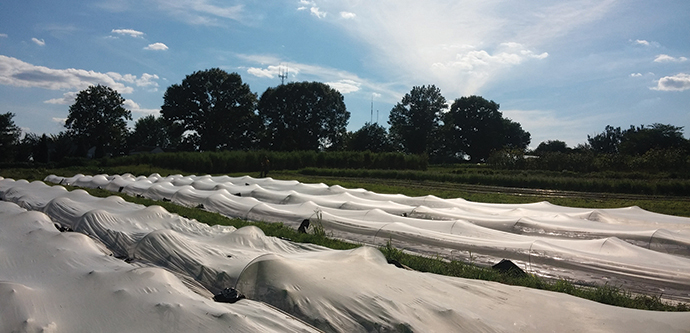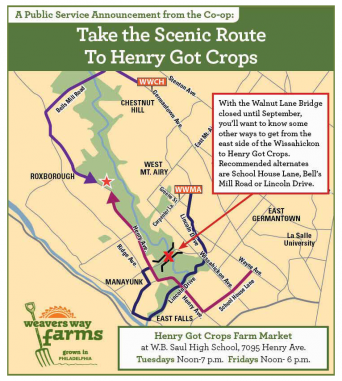
Certified What? Weavers Way Farms Growing Practices

Worried about getting to the farm now that the Walnut Lane Bridge is closed? Here's our map to get you pointed in the right direction.
Are you a Henry Got Crops CSA member? Do you purchase Weavers Way Farm products from the Co-op, the Henry Got Crops Farm Market or Headhouse Market? Before farm products return again this spring we want you to be familiar with our growing practices and understand how our produce is good for you and the environment.
Our farming system follows organic methods, yet we are not certified organic.
Organic farmers begin with soil building and preventative pest and disease controls, and do not use chemical fertilizers, pesticides, and herbicides. To be certified, farmers must demonstrate they are following these methods, and although organic certification offers farmers a marketing edge (especially with consumers who may rarely ever go to the farm), the record-keeping involved can be expensive and unwieldy to apply to our urban locations.
Perhaps more important, we believe that our consumers’ unique relationship and interaction with our farms and farmers create an authentic community-based understanding that engenders the kind of trust that certification can only buy.
We communicate our organic methods to our consumers in many ways:
- Some 43% of our consumers are members of our CSA. We interact with our CSA members every week as they pick up their shares, see farm staff working and ask questions.
- Co-op members are able to engage with our fields and farm staff by doing work hours at the farm .
- Weavers Way shoppers can talk to store staff about the farms — many of them have also done work hours at the farms!
- Our community can stay informed by reading the Shuttle and attending farm events.
Here’s a description of our growing methods, following the standards set by the National Organic Program.
Soil testing: Prior to growing in a new field or area, we test for toxic substances such as “sorbed” metals, mercury, selenium, arsenic, molybdenum, lead and PCBs. Each year we test for soil fertility and apply organic fertilizer based on the needs of our soil.
Fertilizer: Our fields primarily receive a fertilizer mixture derived from peanut meal, blood meal, feather meal, greensand, bone charcoal, aragonite and sulfur.
Compost: Each year we apply about 200 cubic yards of compost made at Saul High School. It covers every inch of our fields.
Cover crops: We utilize cover crops throughout the year to add organic matter, prevent erosion and combat annual weeds. Last year, we added a rotating fallow section with cover cropping throughout the season to allow the soil to rest.
Beneficial microorganisms: We occasionally add beneficial nematodes or symbiotic nitrogen-fixing bacteria to our soil to increase natural populations.
Potting soil: We use organic potting mix from Vermont Compost Company for our seedling propagation.
Seed: We purchase organic seed when available. (The additional cost is not prohibitive.) Some varieties have been selected to be somewhat resistant to some diseases. We often utilize these more resistant options in anticipation of certain diseases each year. We do not use any seed that has been treated with fungicides or genetically modified.
Growing: Our growing system revolves around preventing pest, disease and environmental issues from adversely affecting productivity. From selecting varieties, choosing planting dates and using crop rotation, our disease and pest prevention begins before we plant a seed.
Preventive practices: For pests, row cover, insect netting, squishing and traps; for disease, crop rotation, good airflow, trellising and pruning when necessary, removing infected plants and debris; for weed management, hoeing and hand-weeding, plastic mulch, close plant spacing, transplanting, mowing/weed whacking and creating stale seed beds by using tarps.
If a pest or disease issue is persistent and will significantly affect yields, we may introduce beneficial insects or use an organically approved insecticide. In 2013, we had a bad Mexican bean beetle infestation and introduced beneficial wasps that parasitize the bean beetle larvae. The wasp lays her eggs inside the bean beetle larvae. The wasp larvae feed on the insides of the bean beetle, pupate in it and emerge as adults, killing the beetles in the process.
We may also apply an organic insecticide, such as neem oil, pyrethrins (oils from chrysanthemum flowers), kaolin clay, Bt (bacillus thuringiensis, a naturally occurring bacteria) and insecticidal soap.
Processing: Our vegetables are washed in cool water immediately after harvesting, packed into boxes, bags or bins and refrigerated until they reach you, the consumer! Some delicate vegetables are not washed or refrigerated to retain maximum freshness and flavor, and undergo minimal handling (mostly our tomatoes).
Look for our vegetables at both stores this season. Select the “Our Farms” tab on the website (www.weaversway.coop) for more information on where to buy Weavers Way Farms produce, including the Henry Got Crops Farm Market at Saul High School on Tuesdays and Fridays starting May 3 and the Headhouse Market at 2nd and Lombard streets in Society Hill on Sundays starting May 1.
And don’t just do the reading! Please visit the farm in person this season, see what’s growing and ask us questions!

